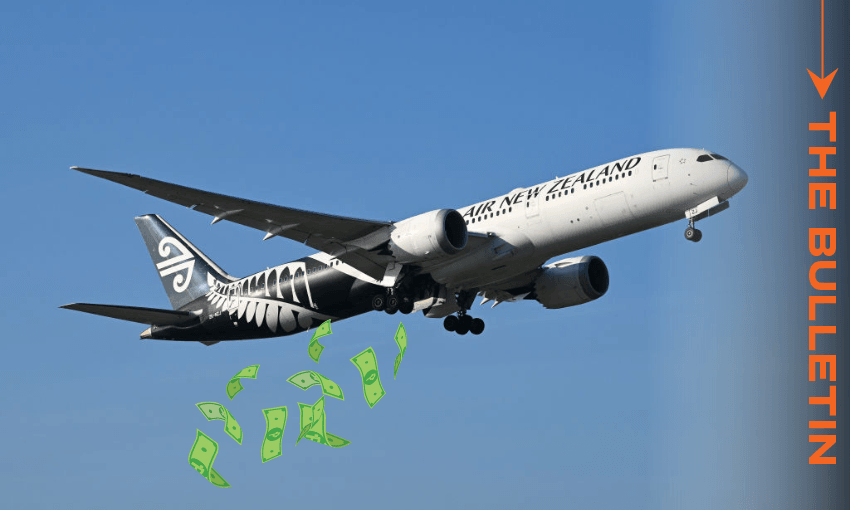In today’s extract from The Bulletin, Stewart Sowman-Lund looks at the compounding pressures facing the national carrier.
To receive The Bulletin in your inbox every weekday morning, sign up here.
Diving profits
A couple of months ago, we talked about the controversy over surging flight prices in New Zealand, with much of the focus being on the national carrier – Air New Zealand. Airfares are regularly in the news, but they’re only small piece in a bigger puzzle. There has been a heightened focus on the airline industry here and abroad this year, with well-covered turbulence at major manufacturer Boeing through to the diving profits of Air New Zealand, as reported last week by the Herald’s Grant Bradley. All of those are in someway connected, so this morning, we’re going to look at some of the issues facing our national airline and what the company’s boss has said about the future.
Compounding pressures
As Bradley reported, Air New Zealand’s after tax net profit for the year ending June was $146m, in line with forecasts but notable given it came after a post-Covid recovery that resulted in one of the company’s best financial results. In a detailed report for The Post this weekend, Roeland van den Bergh explained some of the challenges Air New Zealand is facing now and bracing for in the future. One major issue is increased competition from overseas airlines, not just the perennial rivalry with Qantas on trans-Tasman routes but also from the United States, contributing to a more crowded global market and a battle for cheap fares.
Then there are the global maintenance problems impacting a number of airlines, which have resulted in planes being grounded. The Centre for Aviation reported that Air New Zealand’s new 787s won’t start arriving until the end of next year. “Aircraft groundings due to engine shortages is now commonplace in the industry, but it hits particularly hard for airlines like Air New Zealand that have relatively small fleets,” the industry news site noted.
The climate suffers
Against the backdrop of this, Air New Zealand made the decision to abandon its 2030 climate target, becoming the first major airline to do so. It was a move that made headlines around the globe, perhaps unsurprising given the scrutiny over corporates and their role in contributing to climate change – air travel in particular is one of the biggest contributors to the climate crisis. The airline’s chief executive, Greg Foran, partially blamed the slow “introduction of newer, more fuel-efficient aircraft into the fleet” for making the decision, reported The Guardian.
Earlier in the year, reported Newsroom, Air New Zealand urged for government action to make the purchasing of “sustainable aviation fuel” easier, though the coalition has opted not to move forward with two studies Labour funded into the viability of producing sustainable fuel.
Air New Zealand has opted to keep the industry target of net zero emissions by 2050. But, in a piece for The Spinoff, Danny Rood argued this was an example of “classic greenwashing” – meaning an outward display of good intentions around the climate but with little substance to back it up. “Those setting 2050 targets without a 2030 target won’t be around professionally or politically to dance the accountability waltz,” wrote Rood. “Following through on your commitment matters…”
Writing for the NBR (paywalled), Hamish McNicol and Calida Stuart-Menteath argued that even hitting that 2050 goal seems unlikely given the current state of things. “There are many levers that need to be pulled before it gets off the ground.” In the last week, reported RNZ’s Eloise Gibson, Air New Zealand has come in at the bottom of an Otago University study that ranked big local companies on their climate targets.
What the future holds
In a recent interview with the Herald’s Madison Reidy, Greg Foran said he was optimistic about the future and predicted an economic upturn in the latter half of the year. “It feels like we’re at the bottom of that cycle,” he said. While travel demand has reduced, both domestically and internationally, the airline has made a concerted effort to boost routes in the Asian market. Japan in particular has become a popular destination, aviation analyst Shane Solly told The Post, and Air New Zealand has added thousands of extra seats onto that route, along confirming a return to Seoul.
Further expansion into India, or even a return to Europe, was a longer term goal, Foran told RNZ’s Checkpoint. But that wouldn’t be possible until new planes started to arrive. “It’s a pretty cyclical business,” said Foran. “There are periods when you get tailwinds, and there are periods when you get headwinds.” He’s not wrong, Air New Zealand has been here before and the airline’s profits can bump around as violently as a Bombardier Q300 leaving Wellington. But the challenges on the horizon are newer and, in some cases, out of the airline’s control: more competition, heightened scrutiny on the climate, and maintenance issues keeping aircrafts on the ground.
